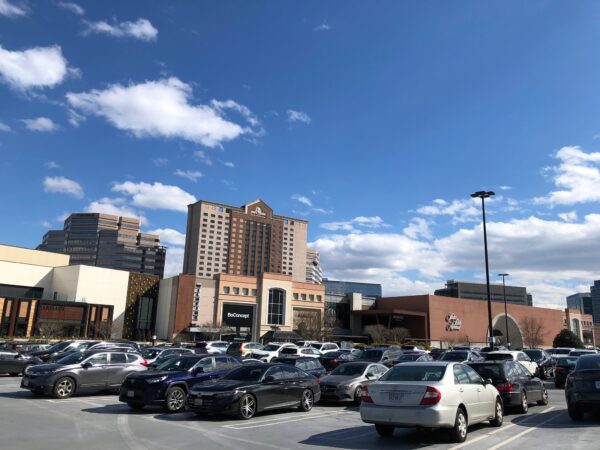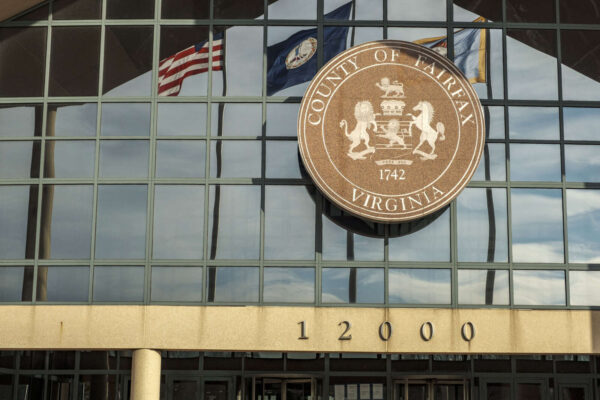
After roughly a decade of relative freedom, Fairfax County Public Schools is sending cellphones back into students’ backpacks.
The Fairfax County School Board is considering restricting the use of personal phones during class for all students as part of several proposed revisions to its Students Rights & Responsibilities handbook, which sets standards for student behavior and discipline.
As proposed during a work session on April 26, the extent of the ban would vary depending on the grade level. Elementary and middle school students would only be allowed to use cellphones before and after the school day, while high schoolers can take them out during lunch and periods between classes.
The revised regulation says teachers could still let students use phones for instructional activities “where they are the most appropriate tool,” but in most cases, the school-issued laptops that most students receive should be adequate.
FCPS has already started to limit phone use in Herndon schools, and Dranesville District School Board Representative Elaine Tholen said at the work session that the changes have had positive results, WTOP reported last week.
The proposed changes mark a shift away from FCPS’ current policy, which embraces technology as a way of “creating a 21st century learning environment” and permits students to use their personal devices to access the internet and work with classmates.
FCPS introduced its Bring Your Own Device policy about a decade ago, as the system started to phase in the school-issued laptops. The initiative, which notes that the use of phones for “personal or recreational purposes” should be minimized, won FCPS a Governor’s Technology Award in 2013.
Since then, some schools across the country have moved to ban phones in classrooms in response to concerns about distractions and excessive screentime, but with 95% of teenagers having access to a smartphone, others have argued that a more effective approach is to set clear guidelines and teach students how to use technology responsibly. Safety and health concerns are also sometimes cited as reasons to allow phones.
What do you think of the proposed changes to FCPS’ phone policy? Should schools accept cellphones as an integral part of many kids’ lives and even a potential teaching tool, or are they just a distraction?
Photo via Adrien/Unsplash

Spring is here, and that means Fairfax County’s farmers markets are starting back up.
Several of the seasonal markets now accept food scraps for compost, including a new site coming to Kingstowne next week.
The market, which runs from 3-7 p.m. Fridays at Kingstowne Center, starting May 6, is one of five farmers markets in the county’s pilot program. The other four markets introduced the option last year, extending composting options at the I-95 Landfill Complex and I-66 Transfer Station.
With Earth Day in the rearview mirror and community advocates stressing the need for the county to step up its environmental initiatives, FFXnow is curious if you have or plan on utilizing the farmers market composting pilot program, even if it plays a small part in addressing the overall issues facing the planet.

It’s been a turbulent couple of years for air travel.
For more than a year, face masks have been a required accessory for flyers due to COVID-19. That ended Monday (April 18) when a federal court ruled against the Biden administration’s mask mandate for public transportation.
The country’s major airlines all dropped their mask requirements even before the federal government confirmed it would not enforce the mandate or appeal the judge’s ruling — a decision that has inspired cheers, anger, and perhaps some relief for flight crews after months of hostile confrontations with passengers.
Even those comfortable with flying from a health perspective, however, might be taken aback when they see what tickets will cost them, as many airlines pass higher fuel costs on to customers.
While plummeting demand led to some bargains during the initial months of the pandemic, the average ticket price nearly returned to pre-pandemic levels in 2021 in the greater D.C. area, and inflation hit 8.5% this month, reaching a level not seen since the 1980s.
Despite those challenges, though, a recent poll by AAA Travel indicates that many people remain eager to travel, with more than 50% of Virginia and D.C. respondents saying they plan to travel more this summer.
How do you feel about flying right now? Does the end of mask requirements make the idea of getting on a plane more or less appealing? Or are the ticket prices more of a sticking point?
Photo via Dulles International Airport/Instagram

Fairfax County’s budget season is in full swing.
The Board of Supervisors will hold public hearings at 3 p.m. today through Thursday (April 12-14), giving residents, community groups, and other stakeholders an opportunity to highlight their concerns and priorities for the spending plan that will take effect on July 1.
About half of the county’s general fund spending goes to Fairfax County Public Schools, which allocates the money based on its own adopted budget. The rest goes to county services, such as the fire and police departments, parks and libraries, public transportation, and more.
Today’s board meeting will also feature public hearings on the property tax rate and proposed water and sewer rate increases.
The budget was advertised with the same property tax rate as this year — $1.14 per $100 of assessed property value.
If the board chooses to keep that in place when the budget is adopted on May 10, property bills will increase by about $666 on average because of rising property values, but officials have the option to lower it.
A new tax rate under $1.06 per $100 of assessed value would bring in the same amount of revenue that the county saw last year.
The county plans to increase sewer service bills by about 6% to $38 on average. The changes, including usage and quarterly base charges, are intended to address increased costs associated with the system.

The Fairfax County School Board is set to require recess at the middle school level for the first time starting next school year.
Under a health and wellness policy revision to be voted on this month, middle schools would be required to have a 15-minute supervised recess break, and elementary school students will get two recess breaks per day, totaling at least 30 minutes.
While the recess requirement is not new for elementary school students, the mandate for middle schools would be a first for the county, although some have implemented one without being required to, according to Fairfax County Public Schools.
The health and wellness policy defines recess as “student-selected structured and unstructured play.” Teachers and staff can’t withhold recess from students “to manage behavior” or use it for instructional activities, including classwork and homework.
According to the Centers for Disease Control and Prevention, recess helps students by providing an outlet for physical activity, reducing disruptive behaviors, and improving memory, attention and social skills.
After FFXnow published an article about the proposed mandate, hundreds of people shared or commented on it on Facebook.
Many supported recess for middle school or wondered why it wasn’t already required. Others were confused why it was needed or what students in middle school would do with that time without jungle gyms like elementary-aged students. Would they just play on their cell phones?
What do you think? Is recess unnecessary at the middle school level? Or do you think middle schoolers — heck, everyone — could benefit from a little fresh air for mental clarity?

Fairfax County’s running bamboo ordinance won’t start until 2023, but its implications are spreading almost as rapidly as the plant it seeks to contain.
On Tuesday (March 22), the county’s Board of Supervisors approved an ordinance that takes effect on Jan. 1, prohibiting people from letting running bamboo spread to someone else’s property.
If a complaint is filed, property owners will receive a notice of violation that requires the issue to be fixed within 30 days.
“It’s going to be imperfect,” Board of Supervisors Chairman Jeff McKay said of the ordinance, requesting staff provide annual reports to see if it needed to be adjusted in the future.
County officials stressed that they will primarily seek to address running bamboo issues through education and encouraging voluntary compliance.
But the ordinance does allow fines of $50 per day as well as $200 per day for additional cases involving a property.
Maximum penalties for a single case were capped at $2,000 in a one-year period, but there’s no limit to the amount of penalties an individual can accrue over multiple cases.
During the meeting, Dranesville District Supervisor John Foust raised concerns about implementing the ordinance but said he felt the board needed to act on the issue.
Foust pushed to lower the cap from $3,000 to $2,000, an amendment to the ordinance that the board passed 9-1, with Mason District Supervisor Penny Gross opposing. She said judges frequently lower the amounts that people could face.

As part of an ongoing review of off-street parking rules, Fairfax County is considering an overhaul of its parking requirements for new development.
Under the proposed tiered system, the number of parking spaces required for a particular development would vary depending on the density of the surrounding area.
Currently, developers must provide a certain amount of parking based on the type of use and how many people their building will serve. The same standards are applied throughout the county, though a special planned district for Tysons has its own rules.
The new system would leave standards for low-density areas largely unchanged, but it would impose a ceiling on the amount of parking allowed in medium-density areas and significantly limit parking in high-density, transit-oriented developments.
Those developments need less parking, because they are designed to be walkable and accessible by transit, so people can get to work, shop, and engage in other activities without having to get into a car, the county’s land-use and planning staff argues.
However, with Metro still reeling from last year’s train derailment and Fairfax County’s efforts to build more pedestrian and bicycle-friendly infrastructure a work in progress, transportation experts say signs point to people driving more frequently than they did before the pandemic as more workers return to offices.
According to The Washington Post, experts attribute the shift toward driving over mass transit to the rise in remote and hybrid work. Commuters might be more willing to drive now — and put up with increasing rush-hour congestion — when they only have to make that trip a couple of times a week.
Do you think having less parking in more developed, transit-oriented areas will help reduce Fairfax County’s reliance on cars, or will it just inconvenience people without producing the desired changes in behavior?

Traffic congestion is no longer the top concern for residents here: It’s now housing affordability, according to a new survey.
A Reston-based research consultant, Heart & Mind Strategies, conducted a survey in December, gathering input from over 600 adults in Northern Virginia, extending research from previous years.
Adults’ top concern used to be reducing traffic congestion and improving transportation options, which was 33% of respondents in 2016, but that’s now dropped to 16%.
Meanwhile, concerns about improving affordability of housing and living, making it easier to afford to live here, increased from 18% in 2016 to 24% in 2019 before dropping to 21%.
The results were shared during a Northern Virginia Transportation Authority meeting last Thursday (March 10). The authority has been assessing the area through its TransAction long-range plan.
To find out more about residents’ needs, we’re asking readers how they’re handling the competitive and pricey real estate market.

Fairfax County government leaders are debating changes to property tax bills amid tensions with soaring home values.
During a regular meeting tomorrow (Tuesday), the Board of Supervisors will likely advertise a property tax rate of $1.14 per $100 of assessed value. That is the same as last year’s rate, but bills are still expected to go up, due to soaring real estate assessments.
Those values are expected to increase by around 9.6% for residential property, according to the county.
The board is considering using available funds in its proposed $4.8 billion budget to potentially lower the rate and provide relief.
The county government relies on real estate taxes for most of that funding, about half of which goes to schools, followed by police, fire and social services.
Supervisors are talking with the public before they adopt a budget this May.

Gov. Glenn Youngkin signed a bill yesterday (Wednesday) making masks optional in schools by March 1.
Fairfax County and other Northern Virginia school systems have continued to require students to wear masks, even after Youngkin issued an executive order that gave parents the choice whether their children wore a mask.
The school board, along with six others, sued the governor, challenging his power to prohibit local mandates. But Senate Bill 739 makes that suit moot, establishing the order as law. All jurisdictions that have mask mandates must make them optional by March 1.
The effort to make masks optional was led by Sen. Chap Petersen (34th District). Petersen said that in the final version of the bill, the governor can reimpose mandatory mitigation measures if necessary.
“COVID-19 has been a tough and stressful time, and our kids have been hit the hardest,” Petersen said in a statement. “We are in a different world than we were two years ago. The vaccine works and is widely available. Universal mask mandates, especially for children who are healthy and vaccinated, is an onerous and outdated measure that will now end on March 1st.”
Fairfax County Public Schools said in a statement that it was reviewing the legislation to determine “what this means for FCPS.” With the bill adding pressure, the school system announced a plan last week to make masks optional once COVID-19 transmission returns to a moderate level in the county.
While cases have been declining in recent weeks, community transmission remains high, as measured by the Centers for Disease Control and Prevention.
When should masks become optional in schools — as soon as possible or when COVID-19 transmission levels are reduced?
Photo via Governor of Virginia/Facebook Live

